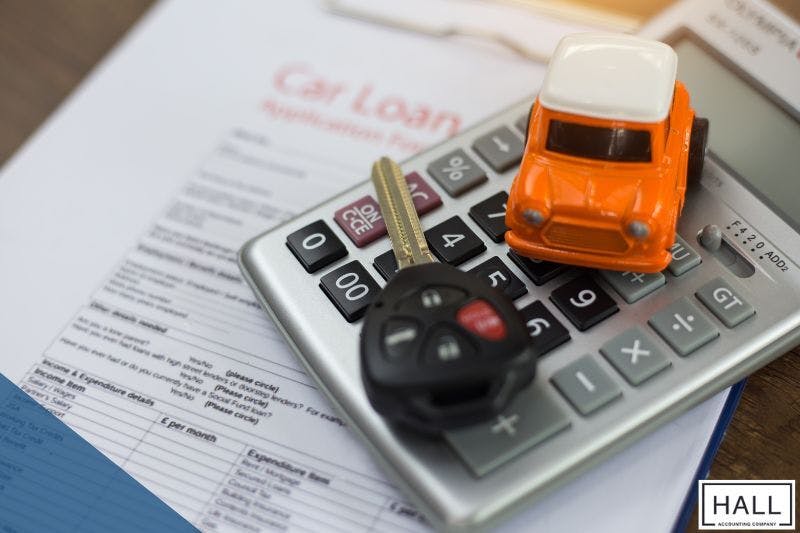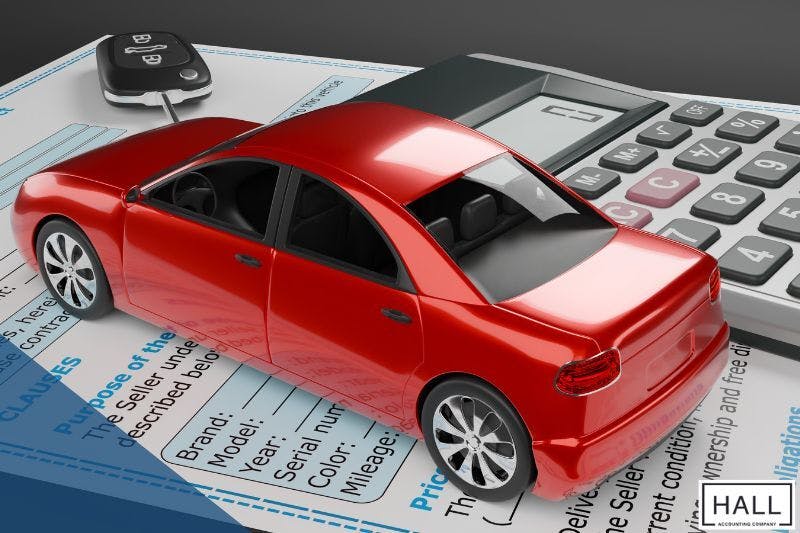
Acquiring a new car for your business is a significant investment, and careful planning is required to mitigate the impact on your business’s cash flow. We discuss the realities around leasing or buying a company vehicle and the tax advantages you can get from these options.
Who qualifies for a car lease tax benefit?
Any self-employed individual, contractor, sole proprietor, or business owner who is a non-salaried 1099 worker can qualify for a tax deduction.
What are your options for acquiring a new business vehicle?
Here in the U.S. the two most common options for businesses to get a new car and benefit from tax deductions is to either lease or buy the vehicle.
Lease a car - a contract between a dealer and a business which allows the lessee to use the vehicle for a set period. It is the responsibility of the lessee to maintain the vehicle, and either return the vehicle to the dealer at the end of the agreement or purchase it.
Buy a car - a finance agreement between a financial services provider and the business in which the business pays back a loan plus interest over a set period. At the end of the period, ownership passes to the buyer.
Business.com recently delved into this subject and reported that the biggest mistake people make when buying or leasing a vehicle is to consider only current needs instead of growth projections and future business needs. We agree - acquiring a vehicle has more to do with accounting than it does with wants and needs. For this reason, we’ve provided a list of questions you should answer before making a choice between leasing and buying.
Lease or buy a vehicle? Answer these questions

Will the car be used solely for business use or both personal and business activities?
What portion of your business income can you afford to give to a monthly car loan payment and related expenses such as car insurance, fuel, and maintenance costs?
Do you plan to claim the costs of the car as a business expense?
Are you open to the idea of car leasing for business purposes, or is it your goal to own your business assets?
Do you fully understand the tax implications of a leased car vs. purchased vehicles?
Will you use the actual expense method or standard mileage rate to benefit from tax savings?
If you’re not sure how to answer some of these questions, you will benefit from the advice of a tax professional. Hall Accounting Company has helped our clients answer these questions and make sound business decisions. If you’re interested in making good financial choices, schedule your free initial consultation today.
Snapshot: Leasing vs. buying a car for business usage
Leasing a car | Buying a car |
Pay to drive a business vehicle for an agreed timeframe. The car must be returned to the dealership at the end of the lease agreement. | The business owns the car, and it can be used for business as long as required. Businesses may sell the vehicle. |
A down payment may be required on the leased vehicle | Down payment of a prescribed percentage |
Lower monthly lease payments | Higher monthly payments depending on the period of the financing agreement |
Restrictions on annual mileage. Going over these limits will attract additional payments. | No restrictions on annual mileage. |
Ability to get an upgraded vehicle at the end of the lease period. | Trade in or purchase a new car to benefit from a newer vehicle. |
Lower costs over a short period but higher costs over a long period. | Higher costs in the short term. Reduced costs once the car is paid up. |
Extra fees may be incurred at the end of the contract. | No further fees once the finance agreement ends. |
Tax benefits of leasing a business car
The tax benefits you can claim when leasing a vehicle relies heavily on whether you will use the vehicle for business or personal use, or both. It also depends on whether you will use the standard mileage rate or the actual expense deduction method. Significant tax benefits can only be gained with careful planning, which includes working on forecasts for the different expense methods before making your decision. We briefly discuss the benefits below.
Deductible lease payments
If you choose actual expenses, you can deduct the part of the lease payment that is for business use, and this will reduce your overall taxable income. All personal usage of the vehicle is excluded from this deduction (even commuting to and from home). Any advance payments must be spread throughout the lease, and leasing a car for 30 days or more will require you to reduce your lease payment deduction by an inclusion amount.
Example:
A small business owner, Sandra, leases a delivery van for a period of 24 months. No advance payments were made. Personal usage of the van is 10% (commuting to and from home), but since the van is equipped with special shelving for transporting of company products, it is considered a ‘non-personal use’ vehicle and therefore not subject to the inclusion amount.
Monthly lease payment: $700
Annual lease payment: $700 x 12 = $8,400
Business use percentage: 90%
💰 Deductible lease expense per annum: $8,400 × 90% = $7,560 per year
Lease payments are treated as operating expenses, which are deducted in full in the period they incurred. To benefit from a greater tax saving, Sandra can stop using the vehicle for personal use, in which case she can claim 100% of the lease payment.
Sales tax

Many states require that you pay local sales tax on a monthly lease, which can increase the total of your entire lease payment. If you live in a state where you must pay sales tax, these costs should be factored into affordability calculations. The IRS provides a sales tax deduction calculator to help you determine how much tax you will pay.
Texas is an exception to this rule, as it requires you to pay taxes on the total purchase price of your vehicle. The leasing company may use the fair market value deduction to reduce the vehicle’s taxable value. No tax is due on the monthly car payments made by the lessee under a lease agreement. This will require you to amortize the sales tax over the lifetime of the lease agreement.
Mileage deduction
To claim this deduction, you must keep track of how much you drive for business usage and how much for personal use. You can only claim the deduction on business use. You will need to choose between the standard mileage rate and actual expenses.
Standard mileage rate - a straightforward way of calculating the business costs of vehicle usage and includes depreciation, lease payments, maintenance, and fuel.
Deduct actual expenses - this method requires you to keep meticulous records, but can benefit you if the cost of leasing and running the vehicle works out higher than the standard mileage rate.
Depreciation
With a leased vehicle, you cannot deduct depreciation since you do not own the vehicle, and the wear-and-tear on the car will be included in the monthly lease payment. You may, however, qualify for a section 179 deduction in the year that the car is put into service.
You will have to deduct the total cost of lease payments in one go, and this only applies to capital leases. If the finance agreement stipulates that you will own the vehicle at the end of the lease period, and bear the responsibility for the loss of the vehicle, it may be a strong indicator of a capital lease.
______________________________________________________________
A tax professional can offer you significant advantages, such as calculating the final costs of a leased vehicle vs. a purchased vehicle for your business. Don’t go it alone when there’s help available. Call Hall Accounting Company today.
______________________________________________________________
Tax benefits of buying a business car

Depreciation deductions
Depreciation of assets only applies to purchased cars, not leased cars, and the vehicle must be in business use at least 50% of the time. You can use one of the following methods to depreciate your car:
The 200% declining balance method (200% DB) over a 5-year recovery period, switches to the straight line method when that method provides an equal or greater deduction.
The 150% declining balance method (150% DB) over a 5-year recovery period switches to the straight line method when that method provides an equal or greater deduction.
The straight-line method (SL) over a 5-year recovery period. [1]
Section 179 deduction
You can elect to recover all or part of the cost of a car that is qualifying section 179 property, up to a limit, by deducting it in the year you place the property in service. However, there is a limit to the amount that can be deducted and also limitations on specific vehicles.
Deductible interest
If a car is used for business purposes and registered under the name of the business, you may qualify for a car finance interest deduction. However, you must itemize this under business expenses.
Example:
Car price: $50,000
Loan amount: $40,000
Annual interest paid: $3,000
Business use percentage: 70%
💰 Deductible interest: $3,000 × 70% = $2,100 deductible interest per year
Sales tax
When you buy a vehicle, you pay sales tax on the full purchase price at the time of the sale. Sales tax can be deducted on your federal tax return if you itemize your deductions, and will reduce your taxable income in the year of purchase.
Mileage deduction
This works the same as when you lease a vehicle, where you can choose a standard mileage rate, or claim actual expenses.
Disposition of a car
If you have ownership of a vehicle and decide to dispose of it, you may have a taxable gain or deductible loss. If you deduct actual car expenses and you dispose of your car before the end of the recovery period (years 2 through 5), you are allowed a reduced depreciation deduction in the year of disposition.
Which option is right for your business?
Lease a vehicle | Buy a vehicle |
You cannot afford a significant down payment to reduce the monthly financing on a vehicle. | You don’t want restrictions on annual mileage, e.g. If the vehicle will be used by a delivery driver, technician, or salesperson who will be required to drive long distances. |
You will use the vehicle for traveling short distances or are sure you can stay within the mileage restrictions. | You want to own the vehicle after the finance agreement expires. |
You don’t want to own the vehicle outright. You want to take advantage of the opportunity to acquire an upgraded vehicle in a relatively short time frame. | You are able to put down a 20-50% down payment that will reduce the monthly repayments. |
Your credit score allows you to benefit from leasing a vehicle. | Your credit record doesn’t meet leasing requirements, which are much stricter than auto loans. |
You’re a business owner that uses the car for mostly business purposes and will claim the costs of leasing and running the vehicle as operating expenses. | You want to take advantage of reducing your taxable income by deducting interest and section 179 deduction, as well as the operating costs of the vehicle. |
A Final Word
Making the decision to lease or buy a car for your business has long term implications (up to 5 years) and that’s why you want to be sure you’re making the right decision. This requires a careful evaluation of the costs and the long term effects on your cash flow.
This discussion has provided you with basic information to get you thinking along the right lines, but it is highly advisable that you work with your accountant or bookkeeper to draw up financial projections before making your final decision. Your business is unique, and only a professional can factor in all the criteria applicable to your company.
If you’re ready to talk, we are waiting to help you make this choice. Call us now.
References: